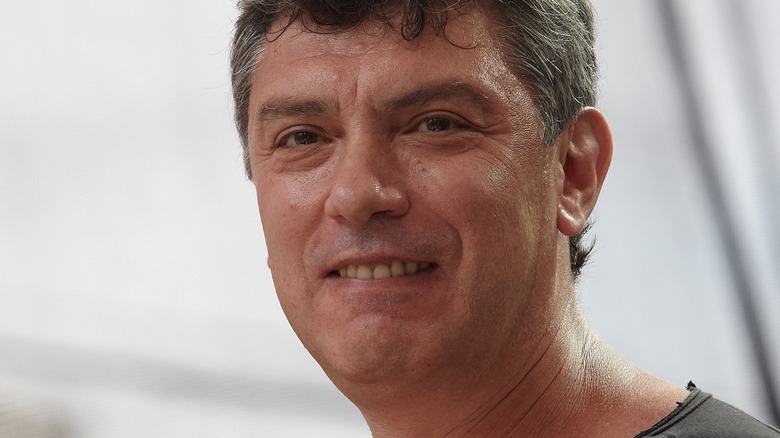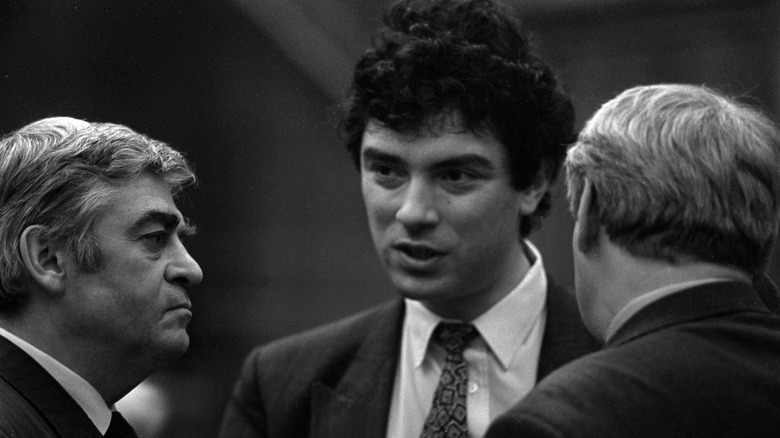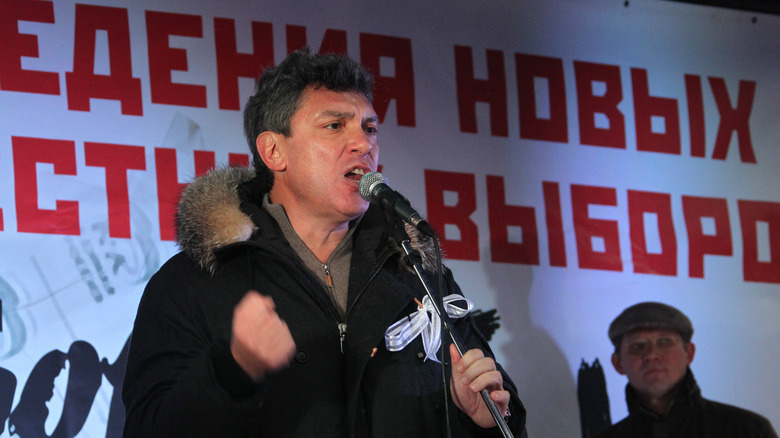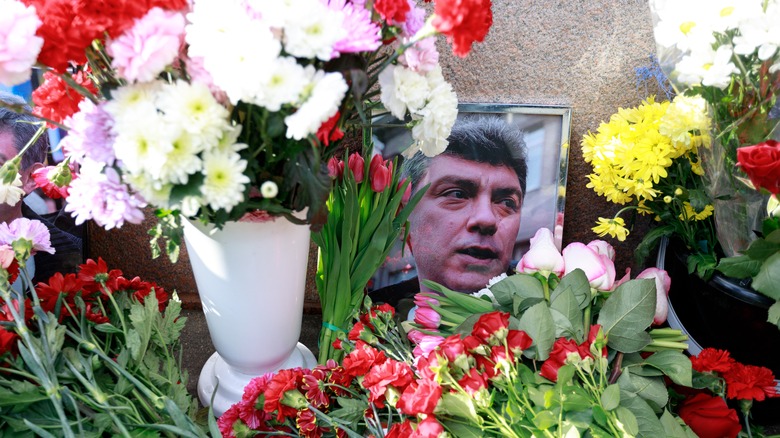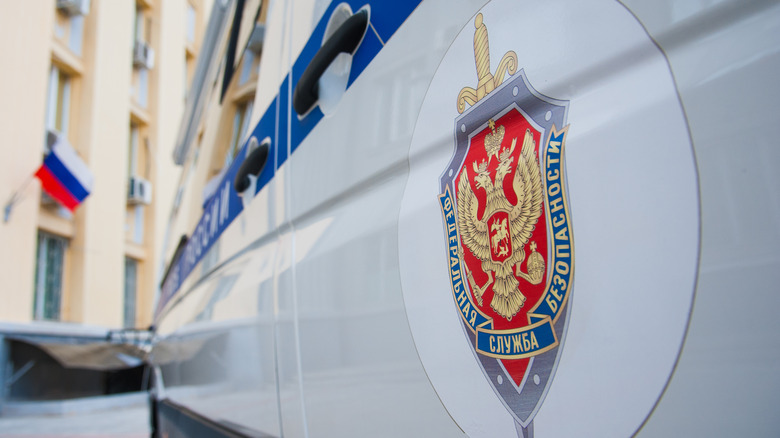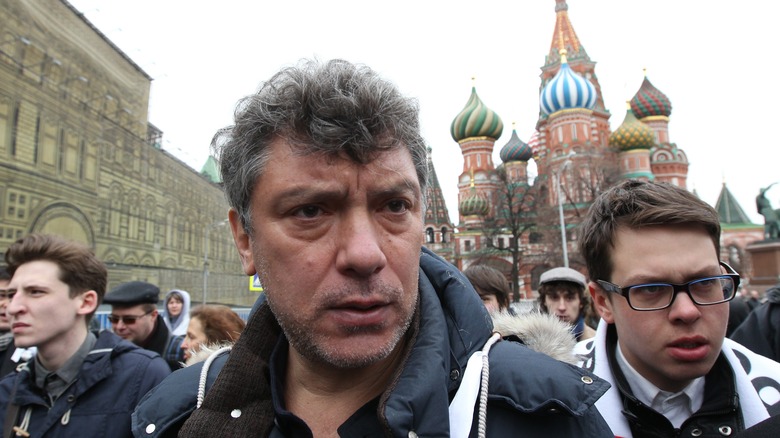Inside The Murder Of Vladimir Putin's Political Opponent, Boris Nemtsov
One of the most eyebrow-raising aspects of Russian President Vladimir Putin's regime is that many people who have dared to present public opposition to his policies and authorities have wound up dead under suspicious circumstances. Of course, this hasn't been the case for every single person who has ever publicly opposed Putin, but it has happened on enough occasions that a pattern seems to have emerged.
According to Insider, one such instance was the murder of Alexander Litvinenko, a former KGB agent, who died in 2006 after drinking poison-laced tea in a London hotel. Litvinenko was a known Putin critic, and an investigation by the British government indicated his death had been carried out by operatives working on orders from Putin and the head of the Russian FSB (a successor to the KGB) Nikolai Patrushev (via The New York Times).
According to The Washington Post, this drew criticism, including from Boris Berezovsky, an exiled tycoon living in the United Kingdom, who just like the British report, accused the Kremlin of involvement in Litvinenko's death. He was found dead under suspicious circumstances in his home, with officials unable to determine a cause of death. While the deaths of Litvinenko and Berezovsky raised suspicions due to their mysterious nature, another Putin opposer, Boris Nemtsov was gunned down in public, not far from the Kremlin.
Nemtsov in the 1990s
According to the BBC, Nemtsov had been a figure in Russian politics since the 1990s, a chaotic time in the nation's history. After the collapse of the Soviet Union, the Russian government and its economy were restructured and it wasn't exactly done in a careful, meticulous way, it was rushed and led to some problems.
The Conversation reported the nation held its first multiparty elections in 1990, with Boris Yeltsin emerging victorious and becoming the country's president. However, there were a pair of attempted coups in 1991 and 1993, both of which failed, but underscored the new national government's fragility.
Yeltsin maintained control through the 1990s, but he needed a successor, and it looked for a time that the successor would be Boris Nemtsov, who had risen through the ranks to become deputy prime minister. However, that's not how it panned out, as Putin secured the presidency instead.
Nemtsov became an outspoken anti-corruption activist
Nemtsov didn't retreat. Even as Putin and company strengthened their grip on Russian politics, he remained in the picture. According to The Washington Post, Nemtsov was at first supportive of Putin, however, he started to withdraw that support as Putin made increasingly controversial decisions and repealed civil liberties post-Soviet reformers like Nemtsov had fought for.
By 2011, Nemtsov was one of Putin's most notable public critics. He was known to organize marches and write reports on the rampant government corruption, and that same year he was arrested for 15 days for his part in protests against the 2011 Russian election (via BBC News).
Nemtsov criticized Putin's government on several fronts. He alleged that there had been corruption during the planning phases of the 2014 Sochi WInter Olympics and pointed the finger at the Kremlin for Russia's worsening economic conditions. He also blamed Russia for the crisis in Ukraine, which in 2014 involved fighting between the Ukrainian government and Russian-supported separatists. Those same separatists were also responsible for shooting down a commercial airliner that killed 298 people, per Vox. Not long before his death, Nemtsov released a report that exposed the Russian government's involvement in Ukraine, something Putin had repeatedly denied (via U.S. Department of State).
The murder of Boris Nemtsov
On February 27, 2015, Nemtsov pled for citizens to join him in a protest a few days later. That night around midnight, Nemtsov was crossing a Moscow bridge just a few blocks from the Kremlin. The outspoken activist fell victim to a drive-by shooting and received four bullets to the back, per The Washington Post.
Putin's immediate reaction was that he claimed the shooting appeared to be a contract killing, the aim of which wasn't to silence Nemtsov but to embarrass the Kremlin. Other opposition leaders and activists critical of Putin felt otherwise, believing that Nemtsov's assassination was intended to send them a message and other potential critics of the Russian government.
According to BBC News, five men were arrested and charged in connection with the murder. The five men were all of Chechen origin, but who was responsible for ordering the death of Boris Nemtsov was either never uncovered or never made public.
Nemtsov had been followed before his death
In 2022 — seven years after Nemtsov was gunned down in Moscow — it was revealed that he had been followed multiple times by a government agent Valery Sukharev. According to leaked flight and train reservation data obtained by the BBC, Nemtsov was followed when he traveled as many as 13 times, including once on a trip just over a week before his death. The FSB keeps tabs on this kind of data using a program called Magistral, however, it only keeps tabs on people that the government wishes to monitor and the agents responsible for following them.
It was revealed that Sukharev has been tied to other assassination attempts including the poisonings of one of Nemtsov's close friends and colleagues, Vladimir Kara-Murza. Kara-Murza was poisoned twice, once in 2015 and again in 2017, but managed to survive them both. While Sukharev was not directly responsible for carrying out the assassinations, phone records indicate that he was in contact with members of the team who were, calling or texting them 145 times.
Sukharev was also linked to another poisoning, this time of Alexei Navalny, known for his anti-corruption videos. Navalny was poisoned using a nerve agent called Novichok, which was developed by the Soviet Union but is banned in most of the rest of the world. Navalny survived but is currently imprisoned. According to The Mirror, during the Russian invasion of Ukraine in 2022, Sukharev was reportedly spotted in the Ukrainian city of Mariupol which was taken under siege by the Russian forces.
Reaction to Nemtsov's murder
Officially, Russia denies any involvement in Nemtsov's or most of the other opposition leaders' deaths. According to BBC News, Dmitry Peskov, the Kremlin spokesperson who is often regarded as Putin's mouthpiece, responded to allegations of the Russian government's involvement in Nemtsov's murder, saying, "All of this has nothing to do with the Russian government. It looks like another fabrication."
Nemtsov is still considered an important figure in Russian opposition circles. The U.S. Department of State released a statement honoring the late activist on the seventh anniversary of his assassination.
"Today marks seven years since Boris Nemtsov, the former Russian Deputy Prime Minister, anti-corruption activist, and physicist was assassinated just blocks from the Kremlin. Through his time in public service and by his civic activism, Nemtsov sought to make his country a better place by exposing corruption and advocating for political and economic reforms, for which he paid the ultimate price," it read.
